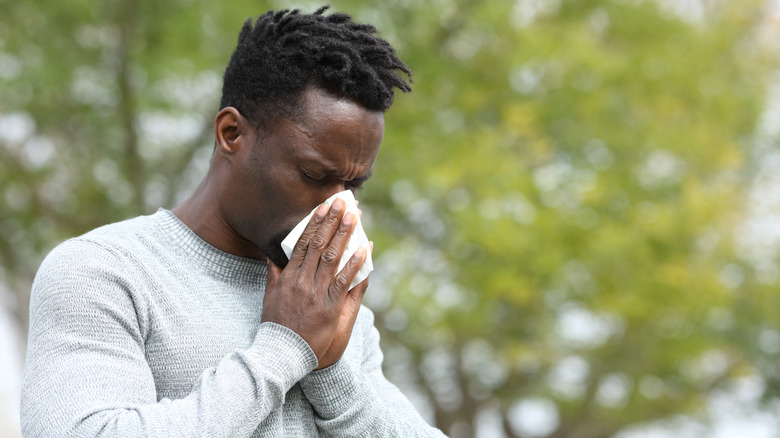An Immunologist Debunks 5 Common Myths About Seasonal Allergies
In 2021, over 25% of American adults were reported to be diagnosed with a seasonal allergy, according to research published by the U.S. Centers for Disease Control and Prevention (CDC). While seasonal allergies may come and go throughout the year, it doesn't make the condition any less debilitating. In an interview with Health Digest, Dr. Purvi Parikh, adult and pediatric allergist and immunologist at Allergy & Asthma Network, addresses the top five myths surrounding seasonal allergies and shares the true facts behind each.
The first myth that Dr. Parikh often hears, she says, is that seasonal allergies present with only mild symptoms. "Allergies can be quite severe causing people to miss work and school, and even get an asthma attack which is life threatening," she states.
"Allergies are the most common cause of asthma – the two go hand in hand. We often see a spike in ER visits and hospitalizations during peak pollen seasons (fall and spring)," Dr. Parikh goes on to explain. As a result, she urges individuals to take asthma-related symptoms seriously. "Do not take coughing, wheezing, chest pain or shortness of breath lightly — asthma causes 10 deaths per day in the USA."
Seasonal allergy treatment myths
Dr. Parikh tells Health Digest that the second most common myth surrounding seasonal allergies is that they only strike during the spring. "People think pollen is only present in the springtime, when there are summer and fall pollens that cause allergies too," she states. "In fact, fall is just as big of an allergy season. Not to mention year-round allergens like dust mites, mold, and animal dander."
The third most common myth Dr. Parikh hears amongst patients is that decongestants are a safe and effective means of long-term treatment for seasonal allergies. However, Dr. Parikh explains that this is not the case. Correcting this notion, she states, "Even though Afrin (oxymetazoline) and pseudoephedrine are over the counter, they are not safe to use long term and actually make your allergies worse."
Rather, Dr. Parikh explains that these medications can often produce undesirable side effects. "They can raise your heart rate, blood pressure and are habit forming. Further, they cause a rebound effect and make your allergies come back worse than they were before," she says. "Do not use these medications for more than 5 days at a time. This also goes for any allergy med that has a 'D' in it," she cautions. "Zyrtec by itself is safe to use for weeks or months on end but Zyrtec-D is not. Same goes for Claritin D, Allegra D etc.," Dr. Parikh clarifies.
It's best to see an allergist
"Allergies are a childhood problem, and many people outgrow them," Dr. Parikh says is the fourth most common myth she hears about seasonal allergies from patients. Setting the record straight, she states, "You can develop seasonal allergies at any age and there are more adults with allergies and asthma than children."
The fifth and final myth Dr. Parikh addresses is that eating local honey on a daily basis will desensitize a patient to their pollen allergy. "Honey does not contain the pollen or allergens that cause seasonal allergies; thus you are not desensitizing yourself or building any immune tolerance this way," Dr. Parikh explains. "Some [people] may feel better from honey but that is likely more of a soothing effect or placebo effect as it does not actually treat allergies."
Dr. Parikh concludes the interview by emphasizing the importance of consulting with an allergist. "See a board-certified allergist and immunologist to be tested to determine if you have allergies and to what," she advises. "This way you can plan and be on the appropriate preventative or controller medications. It is better to be proactive and get on these meds before symptoms are severe," she states. "An allergist can also desensitize you to the allergens making you less allergic overall and thus you won't need as many meds in [the] long run or suffer as much. This is called allergen immunotherapy or allergy shots."



